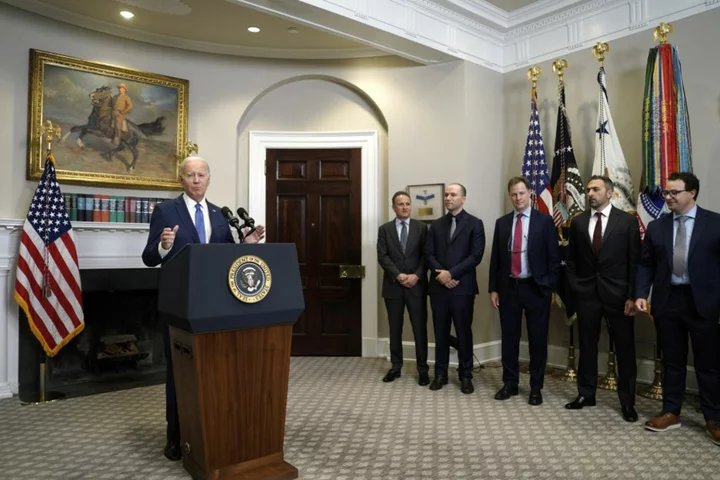On Monday, President Biden will reportedly announce an executive order addressing a wide variety of AI-related issues.
Details about the order are yet to be finalized and made public, but according to The Washington Post, the White House sent out invitations to an event next week about the administration's approach to AI. The order is expected build on "voluntary commitments" from leading AI companies to ensure the technology is built safely, responsibly, and transparently.
SEE ALSO: The FTC is investigating OpenAI for potential consumer harms3 provisions to expect from the AI executive order
As mentioned, the Biden administration is rumored to roll out a broad-sweeping plan that ensures that AI companies are being regulated.
Biden delivered remarks on AI in July alongside the co-founder of OpenAI and CEO of Amazon Web Services (AWS). Credit: Bloomberg/Getty ImagesHere are three mandates we're expecting to hear from the White House next week:
Advanced AI models will be required to "undergo assessments" before federal workers can use them, according to The Washington Post.
AI companies must use cloud computing to track users employing vast computing power that may weaponize the technology, according to Politico.
In other words, the U.S government's purchasing power for national security and cybersecurity consumer protection could shape the development of AI technologies. Guidelines and external security assessments are expected to be managed by the National Institute of Standards and Technology.
The executive order, according to The Washington Post, is expected to "ease immigration barriers for highly skilled workers" to facilitate the White House's goals of accelerating U.S. tech development efforts.
Since OpenAI's ChatGPT kicked off a frenzy in November 2022, one of the major themes of the generative AI conversation is the duality of fear and hype. Even AI leaders like OpenAI CEO Sam Altman have expressed concern for generative AI's risks. Issues like spreading deepfakes/misinformation, enabling cyber attacks, using people's data without consent, and putting workers out of jobs due to automation.
But generative AI also holds promise for improving health and wellbeing, streamlining work across a variety of industries, and gaining a global competitive edge. For this reason, the executive order needs to walk a fine line between mitigating the potential harms of AI and fostering a competitive market.
The order was first mentioned by the Biden-Harris administration in July as part of an announcement securing voluntary commitments from top AI companies to "uphold the highest standards to ensure that innovation doesn’t come at the expense of Americans’ rights and safety." It was referenced again in September when the White House announced commitments from eight more companies.
In total, 15 companies have committed to cooperating with the administration including, Google, Microsoft, Meta, Amazon, OpenAI, Palantir, Adobe, and Nvidia.
Congress has been working on bipartisan legislation to regulate AI, but progress has been slow compared to the European Union's AI Act, the draft of which was approved by European Parliament back in June. Sen. Chuck Schumer, D-NY is leading an ongoing closed-door "AI Insight Forum" that includes top AI executives, scientists, and ethicists.
While promising that AI regulation is a priority, the efforts have been criticized for including too many voices from tech leaders lobbying for their own interests and being held in private.
In addition to Schumer's forum, Sens. Richard Blumenthal, D-CT and Josh Hawley, R-MO announced bipartisan framework, or blueprint for legislating AI laws, similar to the EU's AI Act. But the Biden administration's executive order might be enough pressure on Congress to speed things up.









